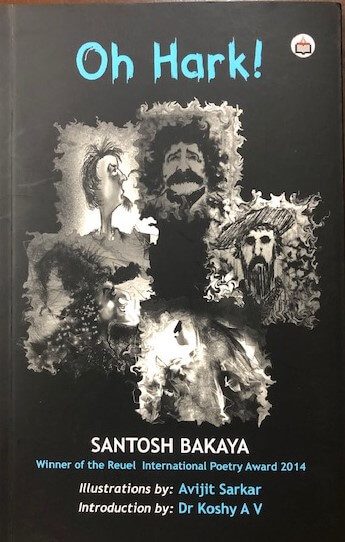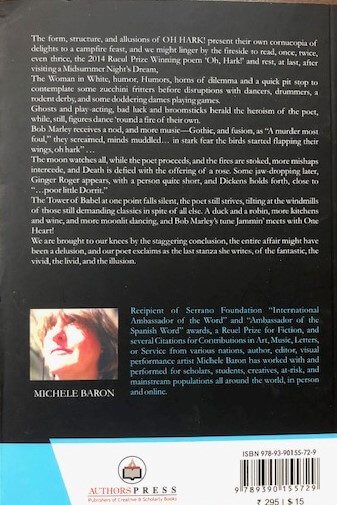Gopal reviews ‘Oh Hark!’, a long poem, by Santosh Bakaya, exclusively for Different Truths.

Author: Santosh Bakaya
Price: Rs 295/-
ISBN 978-93-90155-72-9
Poetry is the act of sharing a piece of you and can create a lasting impact. The language of words, the shape of every letter in poetry is always a pointer to peer inside and the words with which the readers can resonate with and become a part of it. Santosh Bakaya in her Reuel International Poetry Award (2014) winning book, ‘Oh Hark’ manages to entrance readers in her work through kinetic wordplay and ingenious lyricism. Every word is deftly placed, creating a luminous experience for all eyes that ramble across the pages of this long poem.
Poetry is the act of sharing a piece of you and can create a lasting impact.
A.V. Koshy, eminent academician and critic, in his ‘Introduction’ has rightly mentioned, ‘Oh Hark is a potpourri, a salad bowl or aviyal or khichdi or melting pot that bewilders one a bit initially, but gradually begins to fall into place. The method seems to be purely madness at first, but we come to realize later that there is a method in the madness.’
Here the poet is not afraid to be inventive and her choice of words is not only shaped by the language but also the traditions of simple rhyming quatrains pattern. Her work has a lovely shapeliness, and her delicate texturing highlights the bustling nature of a long poem with cadence and rhythm of life.
Her work has a lovely shapeliness…
‘Oh Hark! was written on a lark,’ the poet writes in her ‘Author’s Note’. This long poem is very much about play and unfolds like a single journey floating in a deep, dark dream image. Each page opens onto a wonder, delivering on its eccentric best. Emotive and engaging with a technically superb mix of high and low diction, the words sweep across the pages with elegance.
Gwendolyn Brooks, the African-American poet laureate once said, ‘Words can do wonderful things. They pound, purr. They can urge, they can wheedle, whip, whine. They can sing, sass, singe.’
Santosh believes that poetry can’t be slow, low in pace, and follows a style that effortlessly mixes the conventional to abstract.

Santosh believes that poetry can’t be slow, low in pace and follows a style that effortlessly mixes the conventional to abstract. Her long poem is deeply rooted infused with a strong narrative strand running through them. For her, poetry is not a ripple induced by currents but a tidal wave that sweeps the inner soul and inward journey that explore the silences and undulations as if of the midsummer night’s dream. Avijit Sarkar’s illustrations are rhythmically montaging with the poet’s shining words to dazzling effect and also translates the characters in the poem into dance to emphasise the kinetic elements of the narrative.
The beating of drums had now reached a crescendo
Through the trees, there was visible a wavering glow.
One of the men towards the poet confidently walked
Stood before him, and with the poet his eyes locked. (37.3)
The book is appealing to the end and an imaginative work. The readers will feel that her poetic utterance is relatively easy to read out while difficult to get to the bottom of it.
“Hold my hand, I will pull you out”, said a Good Samaritan, oh hark.
Was it the ghosts’ night out, no light at the end of this tunnel dark?
Behind the trees, the woman in white sat in a swing and smiled.
With fear his stomach rumbled, no longer could he watch beguiled. (5.5)
Clarity and candidness are always Santosh’s watchwords…
One of the poetry’s most appealing elements can be the right choice of the words keeping the essence close to the heart. Clarity and candidness are always Santosh’s watchwords, and her voice here is rightfully of grandeur and pomposity. By employing symbolism, allegory, and abstraction, she can address subjects from ordinary to captivating.
Here the poet creates a surreal world where everyone is searching his or her own space, each ready to fight their corner to the bitterest of ends but the key for achieving the goal of reaching destination lies with a very few. It’s this transcendent moment that pours out the prodigious output with consummate ease.
There are also questions that in a magical era riddled with crisis, madness, mystery and dream and desire of all kinds present themselves insistently and leave us even more dazed and astounded.
The characters in this narrative poem never relate to each other or under the fear of being killed.

The characters in this narrative poem never relate to each other or under the fear of being killed. They are somewhat alike, apart from the difference in their ages and when they scream and sing, others are actually listening, rather than being sealed off behind the edges of their ‘character’. The poet, the Woman in White, the drummers and dancers, little dorrit, Ginger Rogers, doddering dames- all swirl as if in a whirlpool, roaming at will, playing games and dancing by the fireside.
At every point, what the poet perceives is wetted through by what she senses. She implants the situations of his life on to nature with certain cleverness and yet is, at the same time, mindful that she may be finding symbols only because she needs to find them and brings the new and complex surrounds in this illusory world. The suspense persists and at the end the readers hark, pay attention, and listen carefully to the scream and magical medley of the fantasy world welcoming the New Year.
He stood near the window enjoying the rambunctious fun.
Now he fell daydreaming about a world which would be one.
To the beat of the music, he started happily tapping his feet.
With every fibre of his new self, the New Year waiting to greet. (99.5)
Here is a poet who writes narrative poems that are full of life and beyond the ordinary…
Here is a poet who writes narrative poems that are full of life and beyond the ordinary even when she is thinking through love and grief, but in their sweeps, they defy easy notions of aboutness. The thinking is often more complex than the language: the book is full of twists and turns in which the poet seems surprised by what it chooses to show her and delightfully hesitant about visiting his sense of things in the narrative.
‘Oh Hark’ validates a distinctive voice, as well as a convincing and captivating command of tone, texture, style, and technique. It’s a delightful book written by an accomplished poet and a joy to read.
The cover page is impressive. This immensely readable book offers us the chance to escape and at the same time forces us to engage and is a worth buy.
Photos sourced by the reviewer




 By
By
 By
By
 By
By
 By
By
Indeed an exhaustive and lovely review Gopal Lahiriji. Congratulations Santoshji.